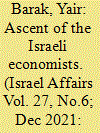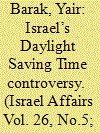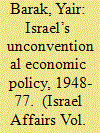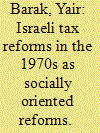|
|
|
Sort Order |
|
|
|
Items / Page
|
|
|
|
|
|
|
| Srl | Item |
| 1 |
ID:
182893


|
|
|
|
|
| Summary/Abstract |
From the Zionist movement’s early days, it mobilised scientific and technical knowledge in order to implement its goals. Economists were also recruited for this mission, but not as decision-makers; they agreed with the political decision makers’ goals and policies and were involved in their implementation. The economists’ secondary status lasted up until the 1980s, when they helped to overcome the hyper-inflation crisis. They were mobilised to back the politicians, who implemented an unusual heterodox massive stabilisation plan. Its success became the economists’ springboard for massive political-economic influence. It was only after the program’s success, that their economic position gradually became central. Their position became dominant in the 1990s, after the politicians implemented privatisation, which opened up the neoliberal era in Israeli socio-economic policy. The political echelon accepted the neoliberal ideology as framework, while the economists actually applied it.
|
|
|
|
|
|
|
|
|
|
|
|
|
|
|
|
| 2 |
ID:
174579


|
|
|
|
|
| Summary/Abstract |
From its establishment until 2013, the issue of Daylight Saving Time (DST) featured on Israel’s political agenda with the religious sector opposing by and large its implementation as an infringement on religious rituals and a disruption of the Hebrew-Jewish calendar and secularists presenting their struggle for DST as a fight of progress (light) against reactionary forces (dark).
|
|
|
|
|
|
|
|
|
|
|
|
|
|
|
|
| 3 |
ID:
185265


|
|
|
|
|
| Summary/Abstract |
Since its establishment in 1948, Israel’s economic policy has been original and unique, since it was loath to accept imported foreign economic ideas, and at times even explicitly rejected them. When such ideas were partly accepted, they were adjusted to local circumstances – economic, social or political – as understood by the political leadership. This unconventional economic policy was successful – not only by conventional economic standards but also when considering the massive socioeconomic challenges confronted by Israel during its first thirty years of statehood.
|
|
|
|
|
|
|
|
|
|
|
|
|
|
|
|
| 4 |
ID:
170704


|
|
|
|
|
| Summary/Abstract |
The income tax reform in Israel that was introduced in August 1975 bridged two ostensible objectives: the enlargement of levying and the provision of a redistributive mechanism. In other words, it aimed to establish a system that would simultaneously achieve economic efficiency and social justice. The reform was unique since it invented an original Credit Points mechanism that linked together efficiency and distributive justice.
Introducing the Value Added Tax a year later was also justified as an indirect progressive tax that could be related to as a business tax rather than as an expenditure tax, levied directly on customers. One of the main concerns of the leading academic economists during that period was the enlarged socio-economic gap. Hence, the two tax reforms were also justified by pro-social arguments.
|
|
|
Key Words
|
Economists
;
Direct taxation
;
Military Burden
;
VAT
;
Tax Burden
;
Credit points, direct tax reform, economists, family grants, inequality, Israbluff, military burden, tax burden, social gap, VAT,
|
|
|
|
|
|
|
|
|
|
|
|
|
|
|
|
|
|
|